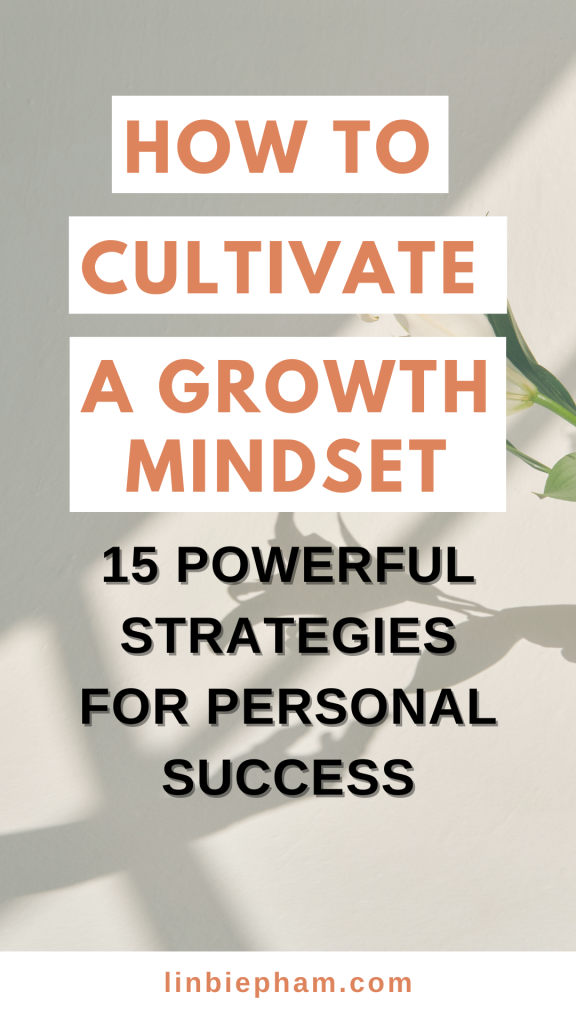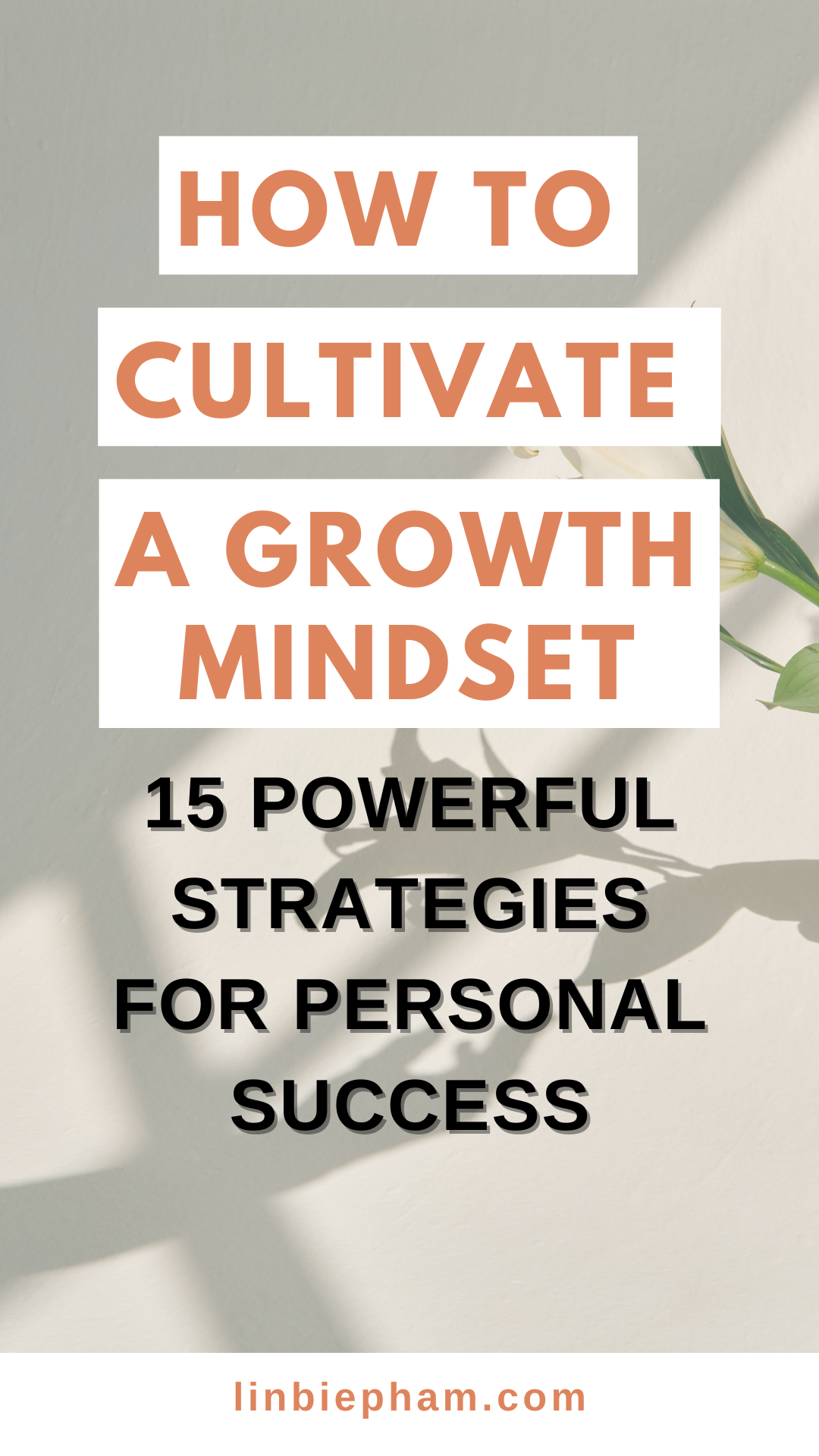Imagine being able to tackle any challenge that comes your way with confidence and enthusiasm. Imagine being able to learn from your failures and use them as stepping stones to success. Imagine being able to achieve your goals and live the life you’ve always wanted.
But for many of us, this is just a dream. We’re held back by a fixed mindset that tells us we’re not good enough, smart enough, or talented enough. We’re afraid to take risks, afraid to fail, and afraid to try new things.
But what if you could break free from this limiting mindset and unlock your true potential? By cultivating a growth mindset, you can develop the skills and confidence to achieve your goals and live the life you’ve always wanted.
In this article, you’ll discover 15 powerful strategies to help you do just that. From practical tips to mindset shifts, we’ll explore the most effective ways to adopt a growth mindset and start achieving the success you deserve.

What is Growth Mindset
A growth mindset is the understanding that our abilities and intelligence can be developed through hard work, dedication, and persistence.
This concept, introduced by Carol Dweck in her 2006 book ‘Mindset: The New Psychology of Success‘, challenges the traditional view that intelligence is fixed and unchangeable.
When we adopt a growth mindset, we begin to see challenges as opportunities for growth and development, rather than threats to our ego.
We become more open to learning, more resilient in the face of failure, and more motivated to achieve our goals.
In the following sections, we’ll explore 15 powerful strategies for cultivating a growth mindset and unlocking your full potential.
Cultivating a Growth Mindset
So, how can you start cultivating a growth mindset and unlocking your full potential?
The good news is that it’s not an all-or-nothing proposition. You don’t have to be born with a growth mindset or wait for some magical moment of transformation.
Instead, you can start developing it by incorporating small, practical habits and strategies into your daily life.
Here are 15 powerful ways to get you started, from simple mindset shifts to actionable techniques for overcoming obstacles and achieving your goals.
1. Develop a Clear Vision
- Explanation: Success begins with a clear understanding of what you want to achieve. A vision is a mental image of your desired future that guides your actions and decisions. It serves as your North Star, providing direction and motivation. Without a clear vision, it’s easy to become distracted or lose motivation.
- Why It Matters: A clear vision helps you stay focused, make better decisions, and align your efforts with your long-term goals. It also inspires you to push through challenges and setbacks.
- Actionable Tip: Create a vision board or write a vision statement that captures your goals and aspirations. Regularly revisit and refine your vision to ensure it remains aligned with your evolving values and priorities.
2. Prioritize Continuous Learning
- Explanation: Continuous learning is about embracing a mindset of growth and curiosity. In a world that’s constantly changing, staying relevant and competitive requires ongoing education and skill development. Whether it’s learning new technologies, improving interpersonal skills, or exploring new fields, continuous learning keeps you adaptable and resilient.
- Why It Matters: Learning new skills and gaining knowledge can open up new opportunities, increase your earning potential, and enhance your ability to solve problems creatively.
- Actionable Tip: Set aside time each week for learning. This could include reading industry-related books, taking online courses, attending seminars, or even listening to podcasts. Keep a learning journal where you note down insights and reflections from your studies.

3. Master Time Management
- Explanation: Time management is the process of organizing and planning how to divide your time between specific activities. Good time management enables you to accomplish more in less time, reduces stress, and leads to career advancement. It’s about working smarter, not harder.
- Why It Matters: Proper time management allows you to prioritize tasks that are most important, ensuring that you make progress on your goals without becoming overwhelmed.
- Actionable Tip: Implement the Pomodoro Technique, where you work for 25 minutes and then take a 5-minute break. This method helps maintain focus and prevent burnout. Additionally, at the start of each week, outline your key tasks and allocate time blocks for each.

4. Cultivate Emotional Intelligence
- Explanation: Emotional intelligence (EI) is the ability to recognize, understand, and manage your own emotions, as well as the emotions of others. High EI is linked to better communication, stronger relationships, and effective conflict resolution. It involves being self-aware, empathetic, and capable of regulating emotions in challenging situations.
- Why It Matters: People with high emotional intelligence tend to be more successful in both personal and professional relationships because they can navigate social complexities and lead with empathy.
- Actionable Tip: Practice active listening by focusing fully on the speaker, avoiding interruptions, and responding thoughtfully. Engage in regular self-reflection to understand your emotional triggers and develop strategies for managing them.

5. Build a Growth Mindset
- Explanation: A growth mindset is the belief that abilities and intelligence can be developed with effort, learning, and persistence. This contrasts with a fixed mindset, where people believe their abilities are static and unchangeable. A growth mindset encourages continuous improvement and resilience in the face of challenges.
- Why It Matters: Individuals with a growth mindset are more likely to embrace challenges, persevere through difficulties, and see effort as a path to mastery, all of which are crucial for personal success.
- Actionable Tip: When encountering a challenge, focus on the learning process rather than the outcome. Celebrate your efforts and progress, regardless of the immediate results. Regularly seek out feedback to identify areas for improvement.
6. Foster Resilience and Adaptability
- Explanation: Resilience is the capacity to recover quickly from difficulties, while adaptability is the ability to adjust to new conditions. Together, these traits enable you to navigate life’s uncertainties and changes without losing sight of your goals. Being resilient and adaptable allows you to turn setbacks into opportunities for growth.
- Why It Matters: The ability to bounce back from setbacks and adapt to new circumstances is essential in today’s fast-paced, ever-changing world. It ensures that you can maintain momentum toward your goals, even when faced with obstacles.
- Actionable Tip: Develop a personal resilience plan that includes stress management techniques like meditation, regular physical activity, and social support. Practice adaptability by consciously stepping out of your comfort zone and embracing new experiences or perspectives.

7. Set SMART Goals
- Explanation: SMART goals—Specific, Measurable, Achievable, Relevant, and Time-bound—provide a structured approach to goal-setting that increases the likelihood of success. By clearly defining what you want to achieve and setting parameters around your goals, you can focus your efforts more effectively and track your progress over time.
- Why It Matters: Clear and structured goals prevent you from feeling overwhelmed by breaking down your vision into manageable tasks. They also help you stay motivated by providing clear milestones and deadlines.
- Actionable Tip: Break down your long-term goals into smaller SMART goals. For example, if your long-term goal is to become a public speaker, a SMART goal might be, “I will give three presentations within the next six months to improve my speaking skills.”
8. Cultivate Strong Habits
- Explanation: Success is often the result of consistent, positive habits. Habits are automatic behaviors that we perform regularly, and they play a crucial role in our daily lives. By cultivating habits that align with your goals, you can ensure that your actions are consistently moving you toward success.
- Why It Matters: Good habits build the foundation for productivity, health, and well-being. They reduce the need for willpower and make it easier to stay on track with your goals.
- Actionable Tip: Start by identifying one key habit that will have a significant impact on your success, such as a morning routine that includes exercise and planning your day. Focus on building this habit until it becomes automatic, then move on to cultivating additional positive habits.
9. Build and Leverage a Supportive Network
- Explanation: A supportive network of mentors, peers, and colleagues can provide guidance, encouragement, and opportunities. Networking is not just about making connections; it’s about building relationships that can help you grow personally and professionally. A strong network can open doors to new opportunities, provide valuable advice, and offer emotional support when needed.
- Why It Matters: No one achieves success alone. Having a network of supportive people around you can provide diverse perspectives, motivate you during challenging times, and introduce you to opportunities you might not have encountered otherwise.
- Actionable Tip: Actively participate in networking events, both online and offline. Follow up with people you meet to build meaningful relationships. Offer value to your network by sharing your knowledge, resources, or connections.

10. Practice Self-Discipline
- Explanation: Self-discipline is the ability to control your impulses, emotions, and behaviors to achieve long-term goals. It’s about doing what needs to be done, even when you don’t feel like doing it. Self-discipline helps you stay focused on your goals and resist short-term temptations.
- Why It Matters: Self-discipline is crucial for maintaining consistency in your efforts. It ensures that you stay on track with your goals, even when motivation is low or distractions arise.
- Actionable Tip: Start by creating a daily routine that includes time for your most important tasks. Set clear boundaries for work and leisure time. Use tools like habit trackers or accountability partners to stay on course and reward yourself for maintaining discipline.
11. Embrace Healthy Living
- Explanation: Physical and mental health are the cornerstones of personal success. A healthy body and mind allow you to perform at your best, maintain focus, and have the energy to pursue your goals. Healthy living includes regular exercise, a balanced diet, sufficient sleep, and effective stress management.
- Why It Matters: When you take care of your health, you enhance your ability to think clearly, manage stress, and sustain energy throughout the day. This directly impacts your productivity and overall well-being.
- Actionable Tip: Incorporate regular exercise into your routine, such as a daily walk, yoga, or gym sessions. Pay attention to your diet by choosing nutrient-rich foods and staying hydrated. Practice relaxation techniques like deep breathing or meditation to reduce stress and improve mental clarity.

12. Take Calculated Risks
- Explanation: Success often requires stepping out of your comfort zone and taking risks. However, these risks should be calculated, meaning they are well-thought-out and aligned with your goals. Taking risks can lead to significant growth and new opportunities that wouldn’t be possible if you played it safe.
- Why It Matters: Calculated risks can push you beyond your limits, helping you discover new strengths and capabilities. They are often necessary for achieving breakthroughs in your personal and professional life.
- Actionable Tip: When faced with a potential risk, list the pros and cons, assess the potential outcomes, and determine if the potential rewards justify the risk. If they do, take the leap, and be prepared to learn from the experience, regardless of the outcome.
13. Reflect and Adapt
- Explanation: Reflection is the process of thinking deeply about your experiences, actions, and results. Regular reflection helps you learn from your successes and failures, identify areas for improvement, and adapt your strategies accordingly. It’s a key component of personal growth and continuous improvement.
- Why It Matters: Without reflection, it’s easy to repeat the same mistakes or miss opportunities for growth. Reflection helps you stay aligned with your goals and make necessary adjustments to your approach.
- Actionable Tip: Schedule regular reflection sessions, such as weekly or monthly reviews, where you assess your progress, challenges, and lessons learned. Use a journal to document your reflections and identify patterns or insights that can inform your future actions.

14. Maintain a Positive Attitude
- Explanation: A positive attitude is the belief that you can handle whatever comes your way and that good things will happen. It’s about focusing on the bright side of situations and maintaining an optimistic outlook, even in the face of adversity. A positive attitude not only makes you more resilient but also attracts positive outcomes and opportunities.
- Why It Matters: A positive attitude can boost your mental and physical health, improve your relationships, and increase your chances of success. It helps you stay motivated and energized, even when things get tough.
- Actionable Tip: Practice gratitude by taking a few minutes each day to reflect on the things you’re thankful for. Surround yourself with positive influences, such as uplifting books, inspiring people, and motivating environments. When faced with challenges, focus on the potential solutions rather than the problems.
15. Give Back and Help Others
- Explanation: Success is not just about what you achieve for yourself but also about how you impact the lives of others. Helping others enriches your own life, fosters a sense of purpose, and builds meaningful connections. Giving back can take many forms, from mentoring and volunteering to simply offering support to those in need.
- Why It Matters: When you help others, you create a positive ripple effect that can inspire and uplift entire communities. It also enhances your own sense of fulfillment and well-being.
- Actionable Tip: Identify causes or communities that you’re passionate about and find ways to contribute. This could be through volunteering your time, sharing your expertise, or providing resources to those who need them. Make giving back a regular part of your life, and observe how it enriches both your life and the lives of others.

Embracing a growth mindset is a journey, not a destination. By incorporating these 15 strategies into your daily life, you’ll be better equipped to tackle challenges, learn from failures, and achieve your goals.
Remember, developing a growth mindset takes time and practice, but the payoff is well worth the effort.
As you start to see the world in a new light, you’ll become more confident, resilient, and open to new experiences.
So why not start today and see the incredible impact it can have on your life?
